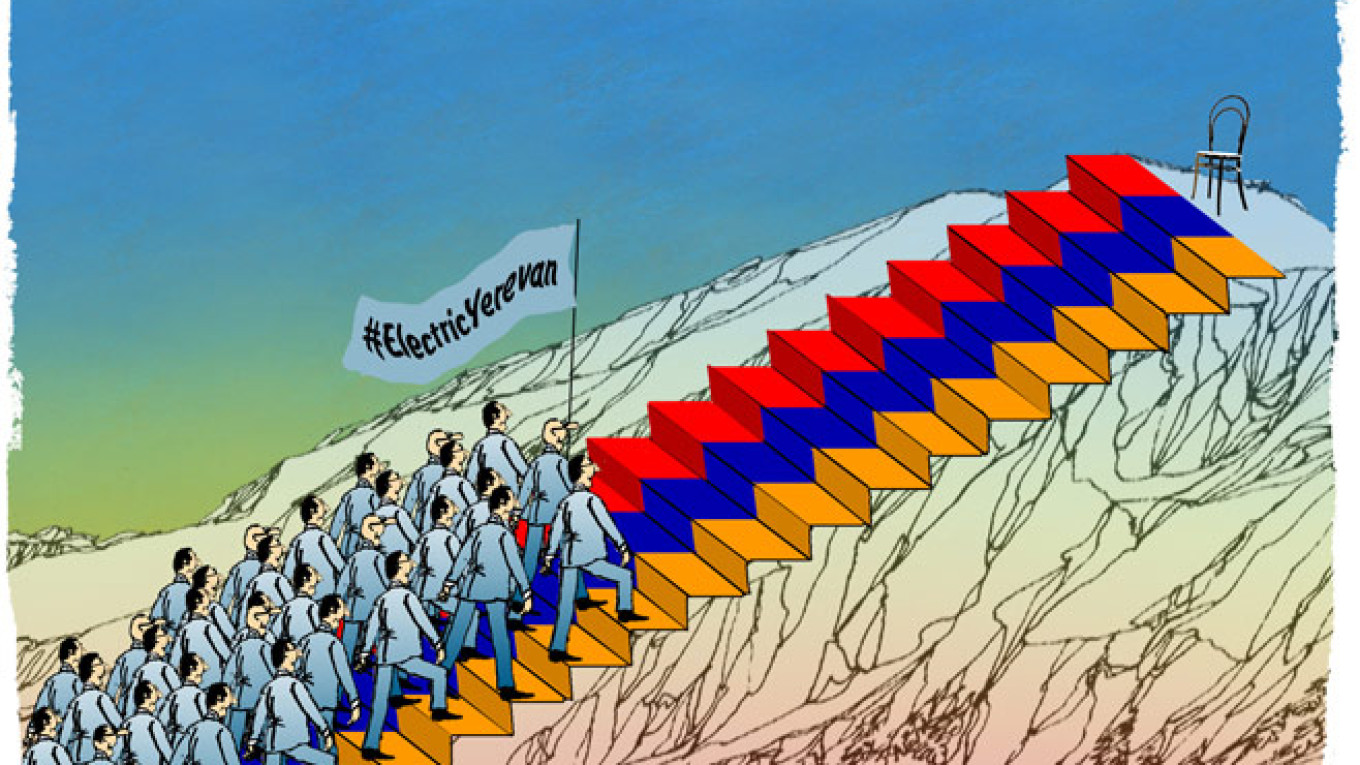A month has passed since the protests that rocked the tiny South Caucasus country of Armenia, making world headlines as the so-called ''Electric Yerevan'' unrest reached its apex. Two weeks of massive round-the-clock demonstrations over a planned 21 percent electricity price hike blocked the city's main thoroughfare, as well as paralyzing many other busy streets.
Of their two initial demands — halting the electricity price hike and investigating claims of police brutality on the first night of protests — both have been satisfied to a certain degree. The government announced that it would not pass on the extra fees to consumers and promptly launched an investigation into the allegations of police violence.
The demonstrators also achieved a number of concessions that they were not even demanding: Among other things, the Russian government, which had been indirectly accused of pushing for the price hike and wary of inciting further unrest in the country, agreed to allow Valery Permyakov, the Russian soldier accused of brutally murdering a family of seven in Gyumri, to be tried by an Armenian court.
The country's water distribution company canceled a similar price hike. The government also called for an audit of Electric Networks of Armenia, began legal proceedings against the company and members of its board was fired.
Most members of the public were not duped by these government compromises. The state has a record of making concessions and expecting concerned citizens to lose interest soon afterward. Countless commissions on corruption have never turned up evidence and controversies involving government-connected oligarchs have usually been solved with the culprit being quietly moved into another post.
Most are aware that the government's promise to subsidize the price hike will mean that it will be taken out of their taxes and that the audit of the electricity company will not reveal much.
Citizens can overlook these issues, because it is clear that Electric Yerevan was a game changer. Up to 30,000 people blocked the streets in several cities. The protesters, mostly young urban professionals, were joined by government employees, politicians and other civil servants. The myth of government invulnerability was on the line.
The children of a generation which had been taught to fear the reach of the omnipotent state were now in open rebellion against it.
Until Electric Yerevan the dominant view on social change in the former Soviet space had been that countries would either drift toward autocracy, like Azerbaijan, Belarus, Kazakhstan, Uzbekistan and Russia, or rapid democratization and pro-Western rapprochement (at the cost of stability) through color revolutions, like Georgia, Ukraine and Moldova.
Armenia, on the other hand, which had long been known to balance Eastern and Western obligations with slow but steady democratic advances, has just pioneered a new narrative on post-soviet social change: that of grassroots-forced evolution, as opposed to revolution.
Keen observers would notice that these protesters, often apolitical, young and professional, differ greatly from the previous generation due to their inclusiveness, and their generally altruistic objectives. "No to Graft" and "Stop Corruption" were among the most popular slogans used by the Electric Yerevan protesters. They called for restraint and respect for the constitution amongst their supporters. Calls for "revolution" were noticeably absent.
Their aims are clear: transparent and responsible government, social inclusiveness and real democratic reform. These calls for political change, in turn, are mirrored by a revival of civil society, artistic expression, openness to the world and assertive national identity. It is within the context of this greater wave of civic activism and blossoming social scene that the Electric Yerevan movement needs to be understood. It is but a stepping stone in a larger drive for national independence, political assertiveness and a free society.
The activists have finally understood that there is no hurry. They know that the government-connected businessmen are a dying breed; symbols of a bygone era. With few government assets left to expropriate, they are beginning to turn on each other.
The activists, meanwhile, take each protest action as a learning experience. Each one is better organized, more sustained, and with more concise aims than the last. It is now understood by everyone that Armenia's people can make their voices heard if need be.
It is now only a matter of when the government will make its next faux pas. Everyone's eyes are now on the parliamentary elections of 2017.
Raffi Elliott is a Canadian-Armenian entrepreneur and activist based in Yerevan, Armenia. He frequently covers socio-economic issues in Armenia and the Caucasus.
A Message from The Moscow Times:
Dear readers,
We are facing unprecedented challenges. Russia's Prosecutor General's Office has designated The Moscow Times as an "undesirable" organization, criminalizing our work and putting our staff at risk of prosecution. This follows our earlier unjust labeling as a "foreign agent."
These actions are direct attempts to silence independent journalism in Russia. The authorities claim our work "discredits the decisions of the Russian leadership." We see things differently: we strive to provide accurate, unbiased reporting on Russia.
We, the journalists of The Moscow Times, refuse to be silenced. But to continue our work, we need your help.
Your support, no matter how small, makes a world of difference. If you can, please support us monthly starting from just $2. It's quick to set up, and every contribution makes a significant impact.
By supporting The Moscow Times, you're defending open, independent journalism in the face of repression. Thank you for standing with us.
Remind me later.



